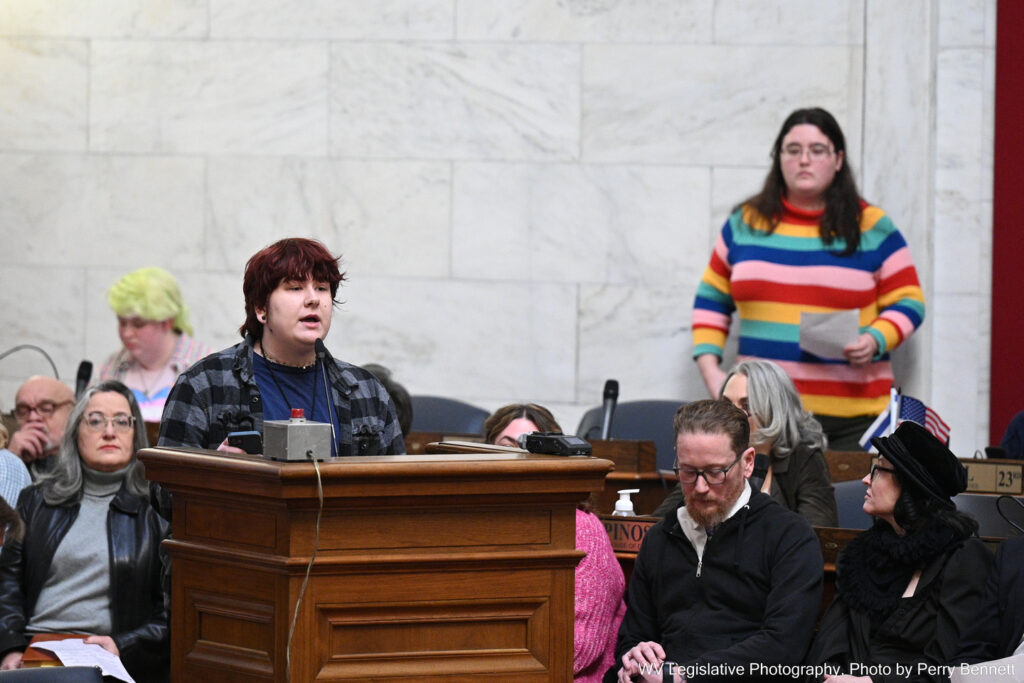The House of Delegates held a public hearing Tuesday on a bill that would restrict West Virginians’ access to the bathrooms, changing rooms, and locker rooms that match their sex. The bill sparked impassioned speeches from attendees on both sides of the issue.
Delegates and members of the public gathered to voice their opinion on House Bill 5243, a bill that attempts to define who is considered female or male.
The bill’s sponsors have named it the ‘Women’s Bill of Rights’. However under the bill there are no specific rights allotted to women.
One of the speakers against the bill was Rust Williams, an advocacy specialist with the American Civil Liberties Union of West Virginia. He said he wishes the Legislature would pass legislation that would help lift up women in the state by addressing equal pay, maternity leave, and removing sales tax on feminine hygiene products like tampons.
“Since you are either incapable or completely ignore interest in drafting bills that actually help, I thought I’d do your job for you and drafted an actual ‘Women’s Bill of Rights’,” Williams said. “This completely restores access to abortion and the full range of reproductive health care services. It removes the tax on feminine hygiene products and infant products such as bottles and diapers, you know, all the things that mothers have to pay for. It addresses menstrual equity and provides period products and all West Virginia schools, jails and prisons. It addresses equal pay, it addresses maternity leave and family leave. It updates the definition of domestic violence to include coercive control.”
Another speaker opposed to the bill was Max Varney, who identified as a “trans West Virginian” and asked legislators how their existence threatens someone.
“I was born and raised in Mingo County. I was a barefoot, holler’ child and my soul resides in the mountains,” said Varney. “I am not an offense to the public. I am not a threat to the public, nor is my existence offensive.”
Varney echoed others who spoke out against the bill by saying that it was not a bill to help women in the state but instead to restrict transgender people’s rights.
“This bill crushes the rights of transgender people. Your willingness to use women’s rights as a cover for transphobia is not shocking, but it is still outrageous and putrid. This bill is dehumanizing,” Varney said.
Nila Thompson was one of the seven attendees to speak in favor of the bill. She said this bill would prevent her from having to share a locker room with a trans girl.
Thompson told a story about a time in August of 2023 that she had to share a changing room with a trans woman.
“Not only would ‘it’ go into the changing room and not even change,” Thompson said. “But he would stand there and watch as other biological females undressed.”
She said following this her family approached the school with concerns and that they told her that if anyone felt uncomfortable, they could use the men’s changing room which was unoccupied during that period.
“The school board made it clear that my rights are not valued, but House Bill 5243 guarantees my rights, safety, privacy and protection,” Thompson said.
Lead sponsor of the bill Del. Kathie Hess Crouse, R-Putnam, said she still plans on voting for the bill, and does not plan on changing any language in the bill after hearing testimony from the 20 speakers against the bill. She said the bill is aptly named the Women’s Bill of Rights because it protects women’s privacy.
“We deserve and have the right to be called a woman and know what a woman is,” Crouse said. “Same with the man, they have that right to know what a man is, and what a man is defined as. And we have a right to our own single sex spaces. And that right should be protected.”
However many trans advocates say that placing a trans woman or trans man in the opposite genders changing room would put them at risk. CDC data shows that 43 percent of transgender youth have been bullied on school property but that trans and LGBTQ people who went to schools that had LGBTQ+ friendly policies had a lower instance of bullying.
The bill is on second reading in the House of Delegates.




















